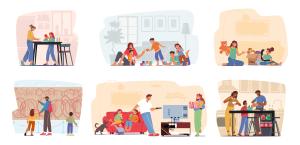The United Nation’s Convention on the Rights of the Child recognises ‘the right of the child to rest and leisure, to engage in play and recreational activities appropriate to the age of the child and to participate freely in cultural life and the arts.’
As Children’s Commissioner, children tell me all the time about the importance of play and especially access to safe outdoor spaces. Play emerged as an important theme in The Big Ambition, with almost 5,000 mentions of the word ‘play’ among comments written by children and adults responding to the survey on their behalf.
Children recognise the benefits of play, and to mark the first UN-recognised International Day of Play today, June 11, I am taking a deeper look at what children told The Big Ambition.
“School doesn’t care about the fact that most children learn better with play even though it has been scientifically proven” – Girl, 11.
In their responses to The Big Ambition, children called for more time and opportunities to play, and better facilities for playing in, including playgrounds and parks. They wrote in The Big Ambition of barriers to play which should be removed, recognising that play opportunities are more limited for some children and in some areas.
“They should make a soft play for disabled children” – Boy, 9.
“Play parks could be better maintained. Around here a lot of equipment has been removed from them and doesn’t seem to be fixed” – Girl, 8.
Children recognised structural barriers like time, money and safety which prevent play from happening:
“I think that children should spend more time with their parents playing games” – Boy, 7.
“Make safer places for children to play in and explore. Make roads safer so I can use my bike” – Boy, 10.
I have explored the world of video gaming, a widespread form of leisure in today’s online world, and found children generally support playing video games and do not see them as a significant cause of harm to their health and wellbeing. Children did say they were more concerned about the impact of multi-player games, and girls were less positive about their impact than boys.
Every child has a right to rest and leisure, to engage in play and recreational activities appropriate for their age and to participate freely in cultural life and the arts. Children want to be able to enjoy these things, and for their peers and friends to have those same opportunities, and they want their views heard and acted on.





